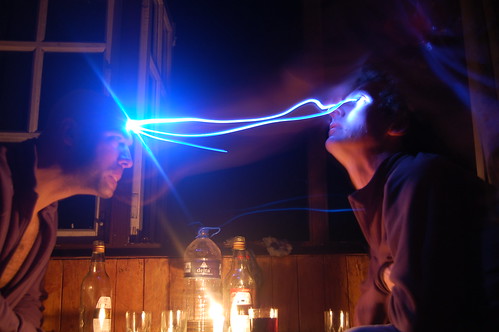Most people regard telepathy in the modern world as pure fantasy. No solid results have come out of parapsychology, and enough people claim to be telepathic to some degree that it’s almost a superstition these days.So it’s no surprise that some well-known science fiction authors consider telepathy to be outside the genre. Charlie Stross, a hard SF author who has won the Hugo and other awards, goes so far as to consider telepathy in SF novels dumpster-diving (“World building 404“).
Telepathy by topastrodfogna / Mauro Sartori | Flickr
And judging by the 1993 Science Fiction Studies article mentioning that “most critics continue to regard ESP as puerile wish fulfillment,” it’s been considered dumpster-diving for quite some time by more than just Charlie Stross.
In my last post, I argued that the movie Another Earth isn’t science fiction enough. Now I’m going to give telepathy the opposite treatment and declare that it is potential science fiction material.
Telepathy in Science
Recently, we’ve seen scientists peeking in on people’s brains using fMRI and mind-reading the words right out of their heads. All of the tests done in this method have required some pretty high-tech gadgetry, even going so far as to place an electrode net on the surface of the brain itself. No magical thought beams here.
In fact, NeuroSky already has brain-computer interface devices available for the average consumer that can effectively read your mind, or, as they put it, your dominant mental state.
Is this telepathy? Maybe not in the strictest definition of the word, mind-to-mind communication. But it’s the first step on the path.
If “the work paves the way for brain implants that could monitor a person’s thoughts and speak words and sentences as they imagine them” (qtd. from The Guardian) then telepathy is really only a hop, skip, and a jump away.
Telepathy as Science Fiction
Which is exactly how science fiction works. We take science, then make a leap into the unknown. Science: Some computers do a decent job at reading a willing person’s mind. Fiction: By some currently unknown means, a human, creature, alien, or AI can read an unwilling person’s mind.
Michio Kaku is a theoretical physicist who considers telepathy as Class I on the spectrum of impossibility. That is, it’s impossible today but does not violate the laws of physics. Check out his book, Physics of the Impossible, which is one of the few nonfiction books to make it onto my Goodreads to-read shelf.
It’s impossible today, but not impossible altogether, and we’ve already taken baby steps in that direction. Telepathy is not off the table for science fiction.
Telepathic power by dubitatif / laurent reyes | Flickr
What If?
Science fiction is the genre that asks “What if?” so let’s use this as a diving board for how telepathy might be used in SF. And try not to land in the dumpster.
- In the future, scientists develop a mind-scanner that allows police to interrogate suspects better than with a polygraph test. (Still not necessarily mind-to-mind communication, but close.)
- Babies are implanted with tracking devices, and the chip also monitors their brain and speech patterns. The chip reads brain waves and blood patterns, learning those patterns over the course of the child’s life. It can then amplify and broadcast thoughts, allowing another person’s chip to receive and process that broadcast — effectively reading minds.
- A powerful AI is able to read a combination of a person’s minute eye twitches, muscle movements, perspiration, breathing patterns, blood flow, and even some brain waves (although currently our brains don’t give off much radiation to work with), processing the information fast enough to effectively predict your thoughts and actions.
- We colonize other worlds and find aliens who can communicate with us telepathically, like in A Beautiful Friendship by David Weber.
- Aliens endow normal Earth animals with the ability to telepathically communicate with humans as in Catacombs by Anne McCaffrey and Elizabeth Ann Scarborough.
- Colonists on an Earth-like planet are infected by a germ that causes thoughts to be loudly broadcast to anyone in hearing range, like in The Knife of Never Letting Go and the rest of the Chaos Walking series by Patrick Ness. (Awesome series — definitely worth checking out.)
- Alien chemicals cause mutations in humans, and later generations are able to telepathically read other people’s minds, as in my speculative fiction novel, The Last of the Ageless.
Of course telepathy also appears in numerous fantasy books, like the Goblin War books by Jim C. Hines and the Bridge of D’Arnath series by Carol Berg (a series I absolutely love).
What other books have you read that feature mind-to-mind communication?
Unfortunately, WordPress does not currently support telepathic broadcasts, but feel free to leave your science fiction and fantasy ideas for telepathy below.


Comments
5 responses to “Telepathy as Science Fiction”
In my “Scaevola’s Triumph” there is “telepathy” to the extent they can communicate by thoughts over a number of kilometres, BUT that is only because the aliens have implanted a strange mesh into their brains that interacts with local power sources. The “telepathy” disappears if there is no power source, so in a sense, it is more like a “built-in” radio.
I tend to think of telepathy as “paranormal” rather than fantasy or sci-fi, but when there are aliens using telepathy, there ya go — sci-fi! ;-} Mainly I think it depends on the story itself & the writer/reader. It is whatever you want it to be.
Morphic resonance, collective unconscious and quantum entanglement all point to telepathy as already existing. Great, huh?
Sally Ember, Ed. D. , author of the science-fiction “The Spanners Series,” which includes psi skills.
I’ve heard of the other two, but what is morphic resonance, Sally?
[…] the interest in the paranormal has fallen off. Another blogger, Traci Loudin, writes in 2012 on ‘Telepathy as Science-Fiction’: Most people regard telepathy in the modern world as pure fantasy. No solid results have come out […]